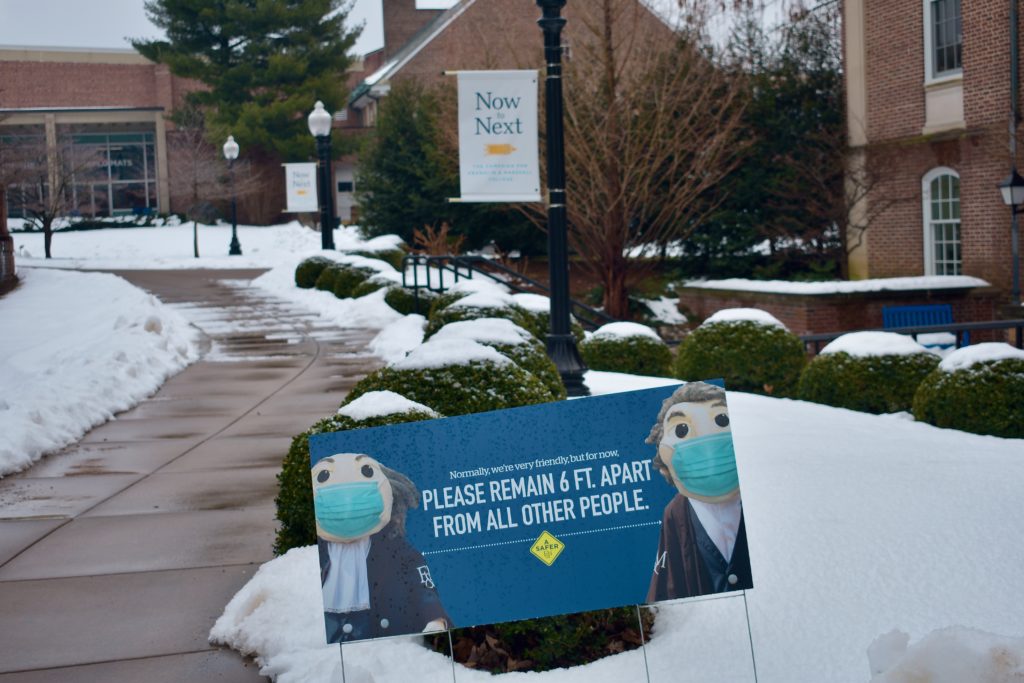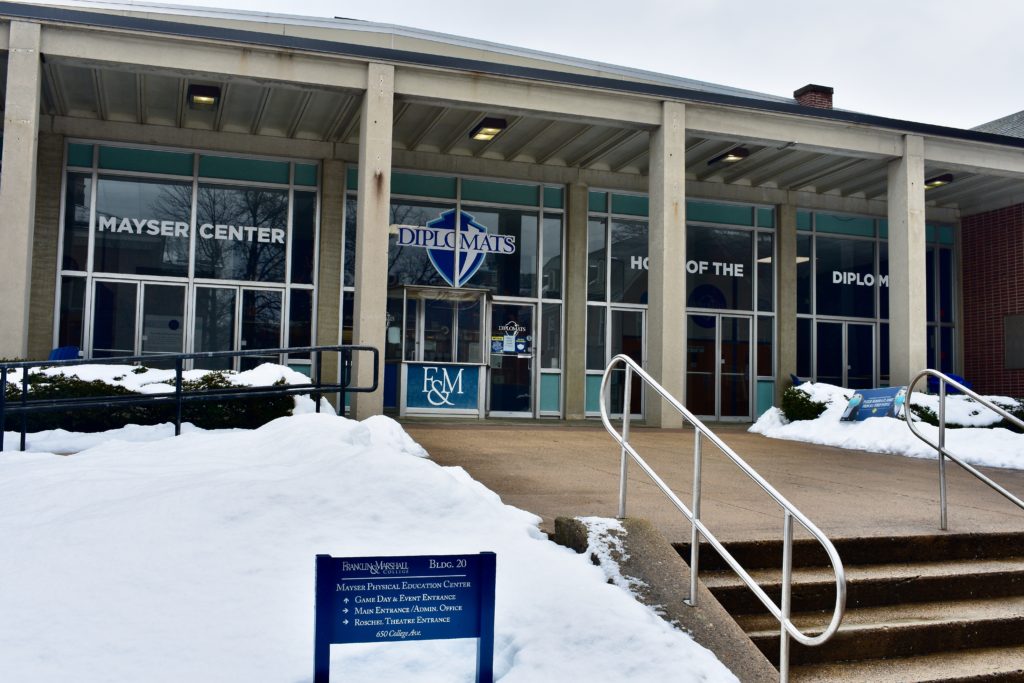By Daniel Robillard || Investigative Reporter

As snow blanketed Franklin & Marshall College this past week, students returned to campus for the spring semester.
The College remains on High Alert Level, which it has been in since Nov. 12, when cases began to spike in the last few weeks of the fall semester. The COVID-19 situation across the nation has worsened since students were last on campus, and there is heightened fear over the presence of new, highly contagious variants of the virus.
Amid an increasingly volatile pandemic environment, F&M has made several changes—including moving to testing all students twice per week—in an effort to improve its COVID-19 response in the spring semester.
Testing Changes
In the fall semester, all students returning to campus were tested twice after arrival and then 20 percent of students, randomly chosen, were to receive tests in the weeks that followed as part of the College’s surveillance testing. Alongside the surveillance testing, the College conducted wastewater testing for several on-campus residence halls.
While the beginning of the fall semester saw relatively few COVID-19 cases, it became clear that the original testing strategy was not sustainable. Entire residence halls were repeatedly placed in modified quarantines for several days as students waited to be tested following the detection of the virus in wastewater samples. There were issues of students skipping mandatory tests and, because the College did not have a regular testing program, most students would not be tested after their two entry tests.
For the second module of the fall semester, the College decided to revise its testing protocols, moving to testing all students twice during the six-week module and no longer placing residence-halls in a modified quarantine after a positive wastewater test result. In total, unless a student was selected for random or additional surveillance testing, most students were only tested four times for the entire fall semester.
In the lead up to the spring semester, the College announced that it would be increasing its testing strategy and testing all students twice per week, a drastic increase from the fall semester. Research has shown that regularly testing the entire student body is necessary to reduce the risk of COVID-19 on college campuses, and many of F&M’s peer institutions have already been testing students several times each week since the start of the fall semester.
“It was a lot of data analysis and the ongoing rise in Lancaster,” Deb Moriarty, the College’s new COVID-19 coordinator, said of the decision to test students twice per week. F&M’s Vice President of Strategic Initiatives Alan Caniglia stressed that the College had been carefully monitoring the COVID-19 situation locally and across the country in between the fall and spring semester. “I would say that there’s a greater awareness of the potential volatility [of the virus], which was a big piece of the rationale to move to testing twice per week,” Caniglia said.
Moriarty said that the College hoped students would view the increase in testing as an extremely rare opportunity to get free COVID-19 tests each week, something that is still limited in many areas unless you are presenting symptoms.

The significant increase in F&M’s testing operation also means that the cost is substantially higher than in the fall semester. In total, the cost of the new testing strategy—which includes the costs of the tests themselves, the nursing staff to administer the tests, and the cost of shipping the tests—will be just under $3 million for the semester, Caniglia told The College Reporter. That total also does not include the time of F&M employees who are helping to manage and operate the testing site each day.
As part of the stimulus package passed by Congress in December, F&M is receiving about $2.4 million from the federal government, about one-third of which has to go to students, and the remaining amount, about $1.5 million, can be used to offset expenses or lost revenue associated with the pandemic.
Caniglia noted that F&M is able to designate enough revenue losses and expenses to receive the extra money, even without the increased testing, and the College isn’t receiving any money specifically tagged for the increased testing operation.
Improvements for the Spring
In addition to the move to testing twice per week, a key part of F&M’s effort to improve the COVID-19 response for the spring was appointing Moriarty to fill the newly created position of COVID-19 Coordinator. Moriarty came to F&M in the fall semester as the Interim Dean of Student affairs. In her new role, Moriarty will be responsible for improving some of the aspects of the COVID-19 response that the College struggled with in the fall. Moriarty staying onboard as COVID-19 Coordinator “is a major additional asset for us in terms of managing the pandemic,” Caniglia said.
“In the fall, communication was such a struggle,” Moriarty said, and emphasized that she would be focused on improving the College’s communication and coordination related to the COVID-19 response for the spring semester. Moriarty also said that the College would be stepping up its response to quarantine and isolation this semester to make students feel more comfortable and welcomed.
Off-Campus Housing
Off-campus housing proved to be one of the biggest challenges that the College faced in the fall semester. According to the data published on F&M’s COVID-19 Dashboard, a majority of F&M’s positive COVID-19 cases last semester came from students living in off-campus housing.
“It’s challenging because, unlike some other schools, F&M does not have on-campus housing for all its students, so some students live in approved third-party apartments off-campus,” Moriarty said. She also told The College Reporter that the College had been partnering with the landlords of off-campus housing to communicate to students the importance of following COVID-19 safety protocols. “The twice per week testing also allows F&M to look for patterns in off-campus housing and catch COVID-19 cases earlier,” she said.
While the College has been able to exert more control over the enforcement of COVID-19 safety protocols for students living in on-campus residence halls, it has struggled to do the same for students living in off-campus housing.
F&M has already started escalating its messaging to students living in off-campus housing. “Those of you living together in apartments have a higher risk of becoming infected; please continue to follow all precautions,” Moriarty said in an email to students on Sunday. “If you demonstrate that you can’t follow the guidelines, we will require you to move to remote status and depart from student housing [including off-campus housing].”
Even as the College has ramped up its COVID-19 prevention this semester, some students continue to push the envelope of what they are allowed to do. While the College has strongly encouraged students to only leave campus for essential activities, such as grocery shopping, dozens of F&M students could be seen going in and out of indoor bars and restaurants this past weekend.
Although the return of students to campus has increased COVID-19 outbreaks in many college towns across the country, Caniglia highlighted that according to a data analysis conducted by the College, “there was no indication that students being present on campus had a negative effect on the community in terms of COVID-19.”
Vaccination Plans
As students become more and more fatigued with the difficulties of a pandemic college experience, many are eagerly awaiting the day when students will be able to receive the COVID-19 vaccine.
“The College’s goal is to be able to provide vaccines on campus, but we cannot do that until Pennsylvania has a good system in place,” Moriarty told The College Reporter. “The Student Wellness Center is a partner of Lancaster General [Health], so we are monitoring the arrival and distribution of vaccines and hoping that this will be on campus.”
However, Caniglia clarified that it will be unlikely that the College will be able to vaccinate students on campus, as most would not be eligible to receive the vaccine until Phase Two of Pennsylvania’s vaccine rollout. “We don’t expect Phase Two to begin until after the spring semester is over, but we are optimistic that Phase Two will be occurring over the summer in Pennsylvania,” Caniglia said.
If Pennsylvania did move into Phase Two at some point during the semester, Caniglia noted that the College would work with Lancaster General and strive to be able to provide vaccines for students.
Junior Daniel Robillard is an Investigative Reporter. His email is drobilla@fandm.edu.
